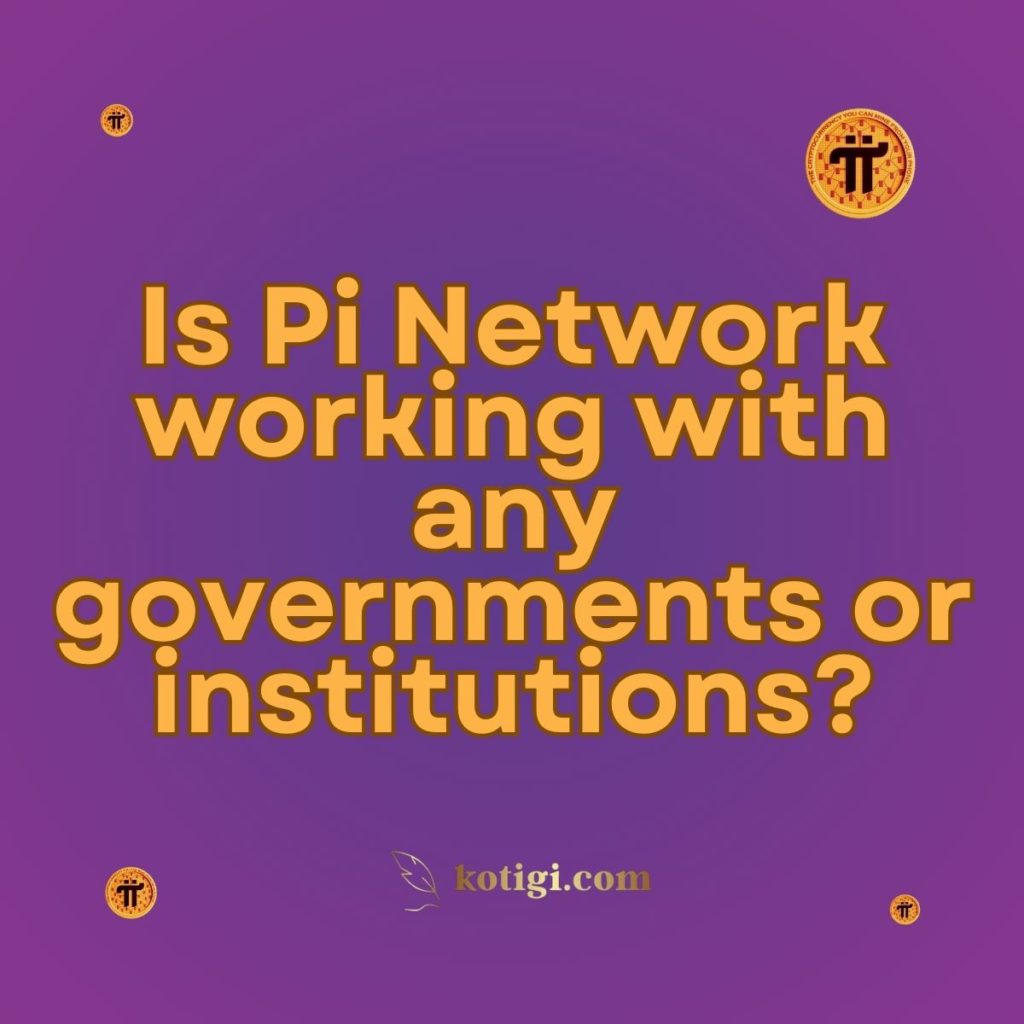
Is Pi Network working with any governments or institutions?
As of now, Pi Network has not officially announced any collaborations or partnerships with governments or major institutions. The network is still in its developmental phase, primarily focused on expanding its user base, refining its technology, and preparing for its mainnet launch. However, the potential for future engagement with governments and institutions remains an intriguing possibility. Here’s a closer look at the current situation and future prospects:
1. Current Status of Government and Institutional Collaboration
1.1. No Formal Government Partnerships:
To date, Pi Network has not disclosed any formal partnerships or collaborations with government entities. The team behind Pi Network has been concentrating on building a decentralized, user-driven cryptocurrency platform, and there has been no public indication of government involvement in its operations.
1.2. Lack of Institutional Collaborations:
Similarly, there are no known partnerships between Pi Network and large institutions, such as financial organizations, academic bodies, or research institutions. The focus has been on grassroots growth and community engagement rather than seeking institutional backing or collaboration at this stage.
2. Potential for Future Government and Institutional Engagement
2.1. Regulatory Compliance and KYC:
One area where Pi Network could potentially engage with governments is in ensuring regulatory compliance. As Pi Network approaches its mainnet launch and moves closer to being recognized as a legitimate cryptocurrency, adhering to government regulations, particularly in areas like Know Your Customer (KYC) and Anti-Money Laundering (AML) protocols, will be crucial. Future interactions with regulatory bodies may become necessary to facilitate this compliance.
2.2. Academic Research Collaborations:
Pi Network could benefit from potential partnerships with academic institutions or research bodies to study and enhance its blockchain technology. Collaborations in this area could lead to innovations in scalability, security, and decentralized governance, strengthening the network’s credibility and technical foundation.
3. Future Prospects for Government and Institutional Partnerships
3.1. Government Blockchain Initiatives:
As governments around the world explore blockchain technology for various applications, from digital currencies to secure voting systems, there may be opportunities for Pi Network to participate in or collaborate on such initiatives. This could involve pilot projects, research collaborations, or integration into government-backed blockchain platforms.
3.2. Institutional Adoption and Support:
In the future, as Pi Network matures and if it gains wider acceptance, there could be opportunities for institutional adoption. Financial institutions might explore the use of Pi coins in digital payment systems or as part of broader cryptocurrency portfolios. Institutional support could also come in the form of partnerships with universities or research centers focused on blockchain technology.
4. Community-Driven Growth vs. Institutional Partnerships
4.1. Decentralized Approach:
Pi Network’s philosophy emphasizes decentralization and community-driven growth. While this grassroots approach has fueled its rapid expansion, it also means that the network has prioritized user engagement over institutional alliances. This approach could evolve over time, especially if strategic partnerships could enhance the network’s adoption and utility.
4.2. Potential Risks and Rewards:
Engaging with governments and institutions could bring both opportunities and challenges. While partnerships could offer resources, credibility, and wider adoption, they could also introduce regulatory scrutiny and potential compromises on decentralization principles. Balancing these factors will be crucial for Pi Network’s future strategy.
Conclusion
Currently, Pi Network has not entered into any official partnerships with governments or large institutions. However, as the network continues to develop and prepare for its mainnet launch, the possibility of future engagement with governmental and institutional entities remains open. Such collaborations could enhance the network’s legitimacy, regulatory compliance, and adoption, but would need to align with Pi Network’s core principles of decentralization and community empowerment. For now, Pi Network remains primarily focused on building its platform and expanding its user community.




